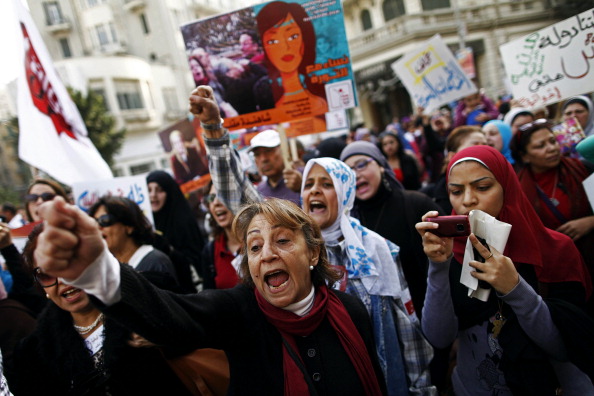
The hopes and aspirations of Egypt’s 2011 uprising may rest in the ability of women to fight back against official discrimination and gender-based violence in the public arena.
Today, women play a leading role in the struggle for human rights in Egypt, but they’re paying a price for it through laws that marginalize them, increasing number of sexual assaults of women protesters and official pronouncements from authorities that women are to blame for the attacks on them.
A new Amnesty International campaign intends to reverse the loss of rights and to reclaim the promises of the Tahrir uprising by demanding that Egyptian authorities, both civilian and military, condemn sexual violence, fulfill their obligations to ensure women have the full spectrum of human rights and to press for accountability for past abuses.
Take action now by signing this online petition for Egyptian President Morsi.
In recent months, women protesters have faced a series of sexual attacks around Tahrir Square that culminated on Jan. 25, the second anniversary of the uprising. The sexual violence appears to have been a failed attempt at deterring women from attending protests and voicing their demands.
The authorities have often done little to stop or investigate such abuses. Instead, they have continued to resist accountability for sexual violence against women previously committed by state agents under the rule of the Supreme Council of the Armed Forces in 2011 and 2012.
Not only are women being assaulted in public, but they’re taking the blame for the assaults. In a Feb. 6 video posted online, one television-station owner said that women protesters had gone to Tahrir Square because they wanted to be raped, and that such women “made their hair fuzzy/untidy” and were “devils.” In addition, members of Egypt’s Upper House of Parliament blamed the women protesters for violence against them in Tahrir Square.
But this is not a message of women being victimized; it is more a story of women activists standing tall and demanding their rights.
Amnesty International has documented the many brave Egyptian women who are not giving in, are not returning silently to their homes, but who are pushing back. There is Engy Ghozlan, an activist working in initiatives to combat sexual violence in Egypt.
There’s ‘Ayesha Amin,’ an activist working for Lesbian, Gay, Bisexual and Transsexual (LGBT) rights. Her name has been changed to protect her identity, but there is little that is quiet about her work.
And there is Azza Hilal Ahmad Suleiman, who was brutally assaulted by the army at a protest in December 2011. Badly injured, she is travelling Egypt and the world demanding that those who attacked her be brought to justice.
These names aren’t world famous, but they have the attention of the Egyptian officials, and they are the agents of change that human rights activists must stand and support.
It is not surprising that government and military officials are looking to roll back the demands of the 2011 uprising by pushing back on women’s rights. This has always been one method that Egyptian leaders can count on to help derail the movement for reform.
But the effort does underscore that the fight for women’s rights in Egypt and elsewhere is in fact a fight to secure full human rights. If there is to be a new era in Egypt of a political culture based on respect for human rights, the authorities as well as all political leaders must first combat their own deep-seated, discriminatory attitudes toward women and their human rights.
